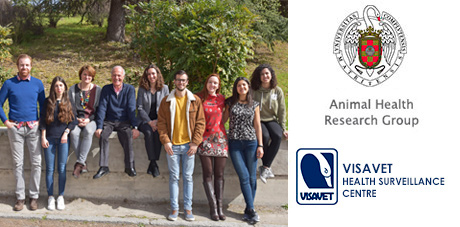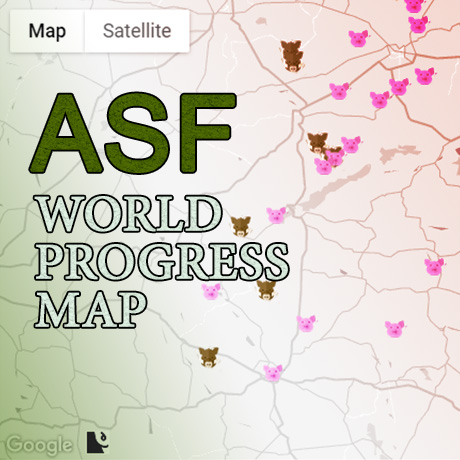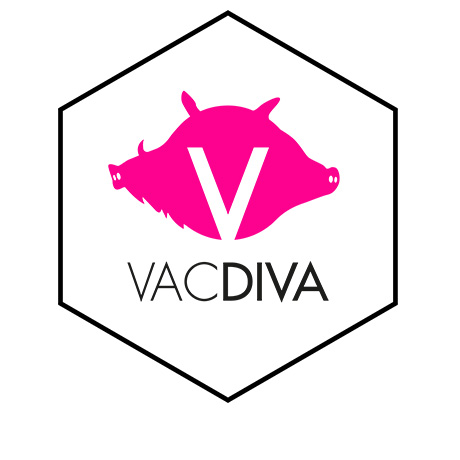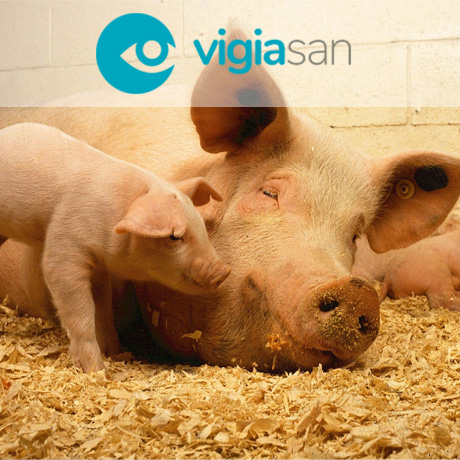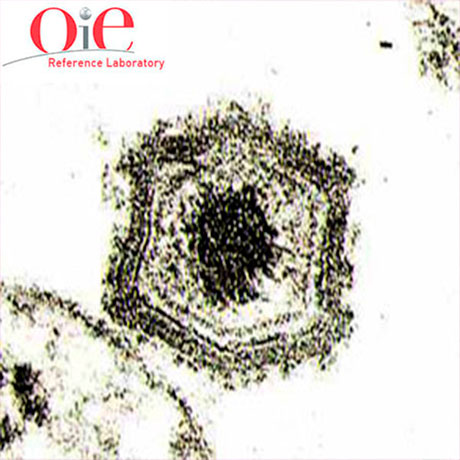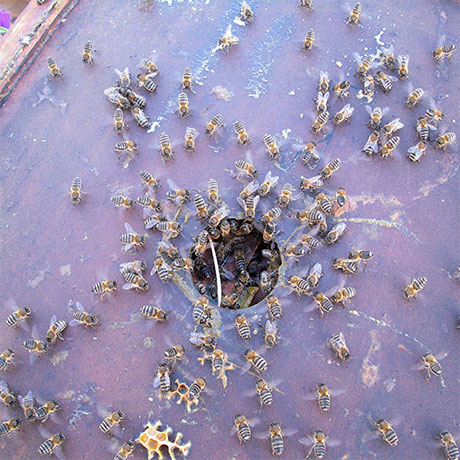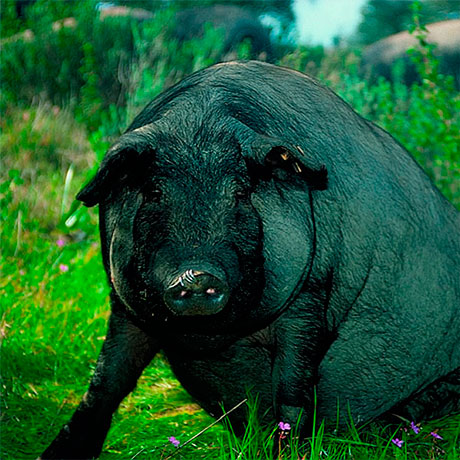26º International Pig Veterinary Congress

On June 21, Professor Sánchez-Vizcaíno participated with the presentation "A current view of the global ASF. What can we expect?”
The Role of the Wild Boar Spreading African Swine Fever Virus in Asia
New research article published in Frontiers in Veterinary Science journal.
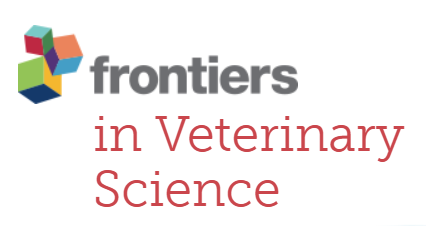 Abstract: African swine fever (ASF) is a highly lethal infectious disease in naïve populations of domestic pigs and wild boar. In Asia, from the first outbreak in August 2018 until the end of November 2021, ASF has been reported in Asian countries. The ASF virus (ASFV) circulation in domestic pigs is considered the main problem in Asia. On the other hand, there are very few reports of ASF in wild boar. However, considering the high wild boar density within the same area of backyard domestic pig farms in Asia, the occurrence of ASFV infection in wild boar may be underestimated. The role of the wild boar in other ASF epidemiological scenarios, such as Europe, is key for the maintenance and transmission of the disease. Hence, we performed a preliminary study estimating the extent of ASFV infection in the Asian wild boar population. The potential risk area of ASF infected wild boar was calculated based on the habitat suitability for wild boar, the kernel density of ASF notification in backyard farms and wild boar, and the ASFV transmission rate of wild boar. As a result of the analysis, high, medium, and low-risk areas were identified throughout southeast and east Asia. The highest risk area was detected in China, followed by Myanmar, far east Russia, Thailand, Vietnam, Laos, Cambodia, and the Philippines. This study shows hot spots where a high risk of infection in wild boar is most likely to occur, helping to control ASF.
Abstract: African swine fever (ASF) is a highly lethal infectious disease in naïve populations of domestic pigs and wild boar. In Asia, from the first outbreak in August 2018 until the end of November 2021, ASF has been reported in Asian countries. The ASF virus (ASFV) circulation in domestic pigs is considered the main problem in Asia. On the other hand, there are very few reports of ASF in wild boar. However, considering the high wild boar density within the same area of backyard domestic pig farms in Asia, the occurrence of ASFV infection in wild boar may be underestimated. The role of the wild boar in other ASF epidemiological scenarios, such as Europe, is key for the maintenance and transmission of the disease. Hence, we performed a preliminary study estimating the extent of ASFV infection in the Asian wild boar population. The potential risk area of ASF infected wild boar was calculated based on the habitat suitability for wild boar, the kernel density of ASF notification in backyard farms and wild boar, and the ASFV transmission rate of wild boar. As a result of the analysis, high, medium, and low-risk areas were identified throughout southeast and east Asia. The highest risk area was detected in China, followed by Myanmar, far east Russia, Thailand, Vietnam, Laos, Cambodia, and the Philippines. This study shows hot spots where a high risk of infection in wild boar is most likely to occur, helping to control ASF.
Cadenas-Fernandez E, Ito S, Aguilar-Vega C, Sanchez-Vizcaino JM & Bosch J.
First Detection of Delta SARS-CoV-2 variant in a Symptomatic Cat in Spain
 New research article in Frontiers in Veterinary Science journal: "First Detection of SARS-CoV-2 B.1.617.2 (Delta) Variant of Concern in a Symptomatic Cat in Spain".
New research article in Frontiers in Veterinary Science journal: "First Detection of SARS-CoV-2 B.1.617.2 (Delta) Variant of Concern in a Symptomatic Cat in Spain".
Abstract: Natural and experimental SARS-CoV-2 infection in pets has been widely evidenced since the beginning of the COVID-19 pandemic. Among the numerous affected animals, cats are one of the most susceptible species. However, little is known about viral pathogenicity and transmissibility in the case of variants of concern (VOCs) in animal hosts, such as the B.1.617.2 (Delta) variant first detected in India. Here, we have identified the B.1.617.2 (Delta) VOC in a cat living with a COVID-19 positive owner. The animal presented mild symptoms (sneezing) and a high viral load was detected in the oropharyngeal swab, suggesting that an active infection was occurring in the upper respiratory tract of the cat. Transmission from the owner to the cat occurred despite the human being fully vaccinated against SARS-CoV-2. This study documents the first detection of B.1.165.2 VOC in a cat in Spain and emphasizes the importance of performing active surveillance and genomic investigation on infected animals.
Barroso-Arevalo S, Sanchez-Morales L, Perez-Sancho M, Dominguez L and Sanchez-Vizcaino JM.
The Evolution of African Swine Fever in China: A Global Threat?
We publish a new open access article "The Evolution of African Swine Fever in China: A Global Threat?" in the journal Frontiers in Veterinary Science.
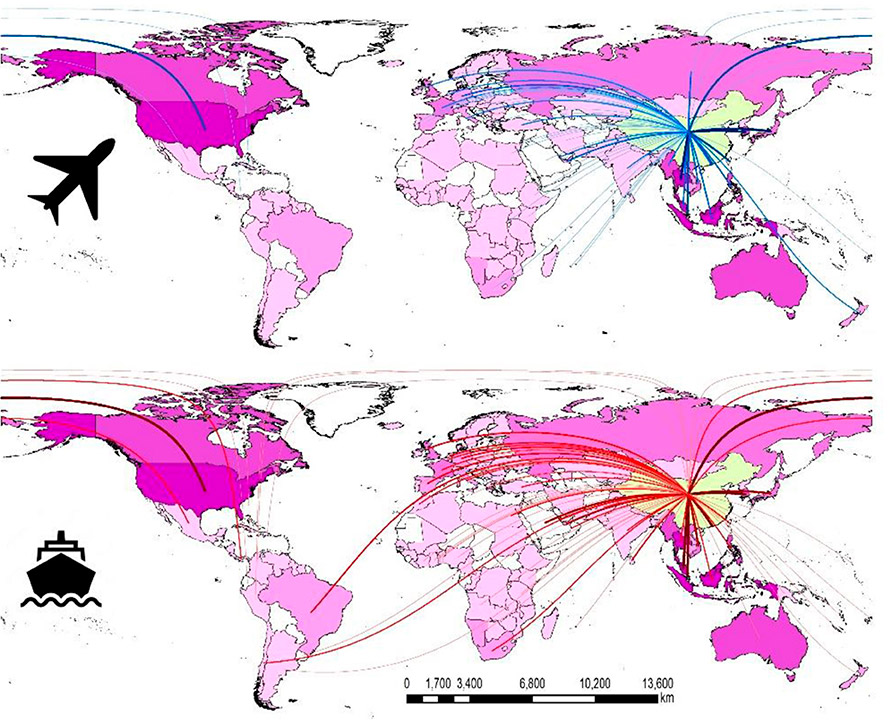 Abstract: African swine fever (ASF) is one of the most critical diseases in the pig industry. In Asia, 15 countries have already reported an outbreak as of November 22, 2021. In 2021, China reported the genotype II lower virulent ASF virus (ASFV) and the emergence of genotype I ASFV. ASF is generally known as a contagious and lethal disease, but if chronic infection spreads, then disease control would be more difficult. In the current study, we highlighted the possibility of lower virulent virus distribution throughout China and the subsequent general risk of the virus being released from the country. The kernel density estimation showed that the two highest kernel density areas of ASF notification were located in Northeast and Midwest China. Four of the five provinces where lower virulent ASFV was isolated overlapped with areas of relatively high ASF notification density. In terms of the risk of ASFV spreading from China, eight of the 10 largest airports and three of the 10 largest seaports are located in areas of relatively high ASF notification density. There were flight flow from China to 67 countries and ship flow to 81 countries. Asia had the highest flight flow, followed by Europe, North America, Africa, and Oceania. The highest number of ship flows was also concentrated in Asia, but about 10% of ships head to Africa and South America. Chinese overseas residents were distributed in each continent in proportion to these results. Here, we highlight the potential risk of ASFV spread from China to the world.
Abstract: African swine fever (ASF) is one of the most critical diseases in the pig industry. In Asia, 15 countries have already reported an outbreak as of November 22, 2021. In 2021, China reported the genotype II lower virulent ASF virus (ASFV) and the emergence of genotype I ASFV. ASF is generally known as a contagious and lethal disease, but if chronic infection spreads, then disease control would be more difficult. In the current study, we highlighted the possibility of lower virulent virus distribution throughout China and the subsequent general risk of the virus being released from the country. The kernel density estimation showed that the two highest kernel density areas of ASF notification were located in Northeast and Midwest China. Four of the five provinces where lower virulent ASFV was isolated overlapped with areas of relatively high ASF notification density. In terms of the risk of ASFV spreading from China, eight of the 10 largest airports and three of the 10 largest seaports are located in areas of relatively high ASF notification density. There were flight flow from China to 67 countries and ship flow to 81 countries. Asia had the highest flight flow, followed by Europe, North America, Africa, and Oceania. The highest number of ship flows was also concentrated in Asia, but about 10% of ships head to Africa and South America. Chinese overseas residents were distributed in each continent in proportion to these results. Here, we highlight the potential risk of ASFV spread from China to the world.
Ito S, Bosch J, Martinez-Aviles M and Sanchez-Vizcaino JM.
Cecilia Aguilar Vega PhD Thesis
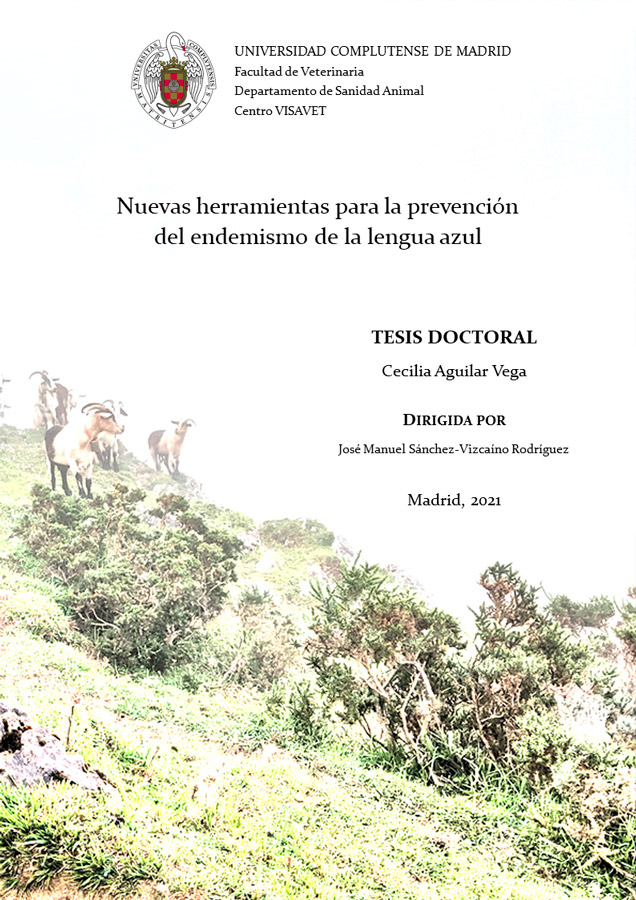
Next monday 9th of May, Cecilia Aguilar Vega will defend her PhD Thesis "New tools to prevent the endemism of bluetongue" directed by Prof. José Manuel Sánchez-Vizcaíno.
The event will take place at 12:00 in the auditorium of the VISAVET Center of the UCM (how to get there).
Abstract:
SARS-CoV-2 infection in cats
New article in the Veterinary Research Communications jorunal: "Evaluation of the clinical evolution and transmission of SARS-CoV-2 infection in cats by simulating natural routes of infection".
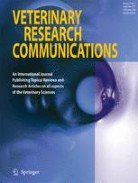 Abstract: Severe acute respiratory syndrome coronavirus 2 (SARS-CoV-2) is the causative agent of the current pandemic disease denominated as Coronavirus Disease 2019 (COVID-19). Several studies suggest that the original source of this virus was a spillover from an animal reservoir and its subsequent adaptation to humans. Of all the different animals affected, cats are one of the most susceptible species. Moreover, several cases of natural infection in domestic and stray cats have been reported in the last few months. Although experimental infection assays have demonstrated that cats are successfully infected and can transmit the virus to other cats by aerosol, the conditions used for these experiments have not been specified in terms of ventilation. We have, therefore, evaluated the susceptibility of cats using routes of infection similar to those expected under natural conditions (exposure to a sneeze, cough, or contaminated environment) by aerosol and oral infection. We have also evaluated the transmission capacity among infected and naïve cats using different air exchange levels. Despite being infected using natural routes and shed virus for a long period, the cats did not transmit the virus to contact cats when air renovation features were employed. The infected animals also developed gross and histological lesions in several organs. These outcomes confirm that cats are at risk of infection when exposed to infected people, but do not transmit the virus to other cats with high rates of air renovation.
Abstract: Severe acute respiratory syndrome coronavirus 2 (SARS-CoV-2) is the causative agent of the current pandemic disease denominated as Coronavirus Disease 2019 (COVID-19). Several studies suggest that the original source of this virus was a spillover from an animal reservoir and its subsequent adaptation to humans. Of all the different animals affected, cats are one of the most susceptible species. Moreover, several cases of natural infection in domestic and stray cats have been reported in the last few months. Although experimental infection assays have demonstrated that cats are successfully infected and can transmit the virus to other cats by aerosol, the conditions used for these experiments have not been specified in terms of ventilation. We have, therefore, evaluated the susceptibility of cats using routes of infection similar to those expected under natural conditions (exposure to a sneeze, cough, or contaminated environment) by aerosol and oral infection. We have also evaluated the transmission capacity among infected and naïve cats using different air exchange levels. Despite being infected using natural routes and shed virus for a long period, the cats did not transmit the virus to contact cats when air renovation features were employed. The infected animals also developed gross and histological lesions in several organs. These outcomes confirm that cats are at risk of infection when exposed to infected people, but do not transmit the virus to other cats with high rates of air renovation.
Barroso-Arevalo S, Sanchez-Morales L., Barasona JA, Rivera B, Sanchez R. Risalde MA, Agullo-Ros I & Sanchez-Vizcaino JM.



